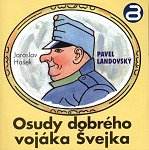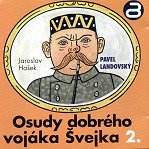The
Good Soldier Švejk – or more formally and laconically The Good
Soldier Švejk and his Fortunes in the World War – has long outlasted
its anarchic, capricious, bigamist, fabulist author. Hašek died
in 1923 leaving the fourth volume unfinished and its subsequent
conclusion by his friend Karel Vanĕk has not generally been
accepted as authentic. It was certainly dismissed by Cecil Parrott
in his first authoritative English translation – which was as
late as 1973, earlier editions having greatly bowdlerised Hašek’s
earthiness and demotic power. The Prague vernacular and the Rabelaisian
vulgarity of Hašek’s creation co-exist with his own autobiographical
experience as a nationalist Czech of occasionally paradoxical
(not least frequently held anarchic) viewpoints. As with his own
life so with his immortal creation; Švejk has been taken as a
holy fool, an embodiment of passive resistance, a dolt with an
instinctual understanding of power relationships, the spirit of
Czech nationalist anti-authoritarianism in its widest form. In
fact whether there is anything specifically rooted in the Czech
Lands about Švejk is a moot point. He could quite as easily, but
for the patois, be Slovak or Galician or any other denizen of
the Austro-Hungarian Empire.
Whatever
Švejk is or isn’t and however he may now be perceived – and there
was a long time in which the book was widely repudiated by the
Czechoslovak intelligentsia as an embarrassment or aberration
– he remains to many Czechs and Slovaks full of, as my father-in-law
said to me when he heard I was writing this, Pravda a Humor.
Arco Diva has now enlisted the distinguished actor Pavel Landovský
to read what I take to be the entire text in Czech. I have listened
to volumes one and two and they cover the first eight chapters,
from The Good Soldier Švejk Intervenes in the Great War to Švejk
the Malingerer (Penguin 1973). I am no expert on the current editorial
state of the book, which has always been something of a desultory
mess due to Hašek’s cavalier attitude to his work but this seems
set to be a Complete Listener in Anglo-American terms; a talking
book that faithfully mirrors the text. There do seem to be a few
nips and tucks however. The sentence beginning To musíte
jít v cylindru…[Slovenský Spisovateľ, Bratislava
1985 p14] from the opening chapter is missing for example and
other instances of slight excisions have presumably been made
throughout. Landovský is a gruff, eruptive presence, his lived-in
voice rumbling baritonally suddenly to explode in a wheedling
uproar – the kind of voice that is perpetually on the brink of
a hoarse, unstoppable, cardiac-inducing cough. One of his drollest
turns is in the third chapter, where he relishes the famous "paragraph"
passage for its considerable comic potential.
A
fine start then to what promises to be a noble endeavour in enshrining
this classic on CD. The discs are graced by Josef Lada’s famous
caricatures, which, in one of those Hašek ironies, the writer
never lived to see. No notes as such – some introductory words
from Landovský are printed in volume one.
Jonathan
Woolf
The
Arcodiva catalogue is now offered by MusicWeb

